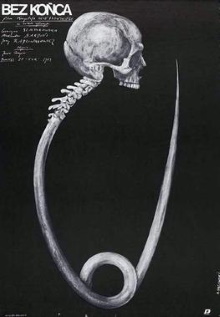Director Krzysztof Kieślowski is well known for his Three Colours trilogy which I’ve already talked about here. This one is an earlier work that he made while still based in Poland and some have noted that it can be seen as a sort of dry run of Blue, the two being similar in that they are about wives dealing with the grief of their husbands’ deaths. However this one takes place during the martial law period in Poland and so political events tend to overshadow one woman’s grief.
Antek, a lawyer, dies suddenly one morning before going to work but his ghost seemingly remains behind to observe his distraught wife and son. The next day, the wife Ulla is contacted by Joanna, the wife of one of Antek’s clients, a man imprisoned for organizing a strike. She wants access to the case documents as she believes there is a hidden message in them. Ulla arranges for the case to transferred to Antek’s old mentor Labrador. The old man is at first reluctant to take up the case due to its political nature but changes his mind when he learns that reforms will soon push him to retire from the court. Meanwhile Ulla who had previously thought that her marriage had gone stale, realizes how much she misses Antek and how much she loves him. Some strange events lead her to believe that Antek is still hanging around. The other person who seems to sense Antek is Darek the prisoner. Labrador advises Darek to compromise with the authorities to get out of prison instead of trying to become a hero and admits that this is probably the opposite of what Antek would have advised.
The two themes and narratives running through this film are distinctly different so it’s somewhat strange to see this combination. Ulla later does become friends with Joanna but as she says herself, she is not a particularly political person and so is not really involved in Darek’s dilemma over what to do. On her end, Joanna advises Ulla that it is okay to move on but not understand that Ulla really does still feel his presence. I can’t discern any deep connection between the two narratives except that it heightens the sense of despair and hopelessness. The explicitly supernatural fact of Antek’s continued presence, together with the haunting melody of the film’s main theme, adds to the eeriness. In a sense at the end of the film both Ulla and Darek get what they want, but it is not a victory at all for both of them as even Darek’s family members see no cause for celebration in court.
The emotional intensity of the film is incredible as is the atmosphere of fear in Poland. Still this is not a very accessible film. This is a Polish film made for a domestic Polish audience and as such it presumes that the audience already know what it is trying to say about the state of society at the time without having to explicitly spell it out. The link between the two parallel narratives seems rather weak as well as Antek is a non-character who merely silently observes most of the time and yet is the one thing Ulla and Darek have in common. You get the feeling that the film is making a powerful statement yet you’re not quite what it is trying to say. As others have pointed out, Kieślowski seems to have further refined what he was going for here for a non-Polish audience in Blue so it’s questionable if you need to watch this one. For committed fans, certainly but for others, maybe not.
